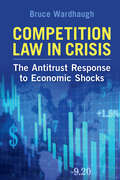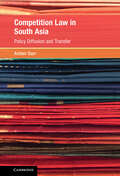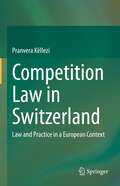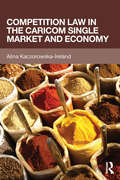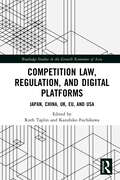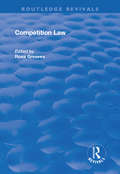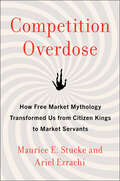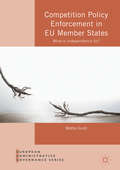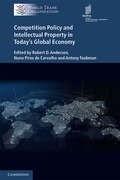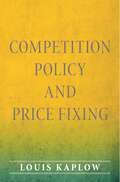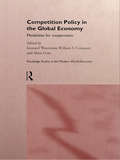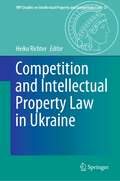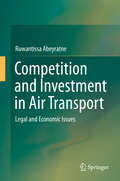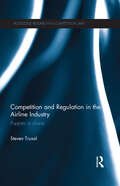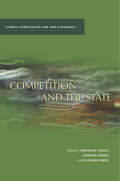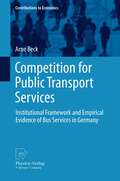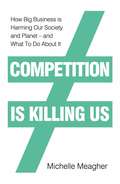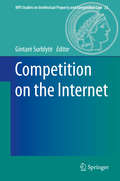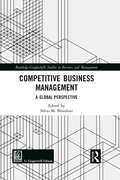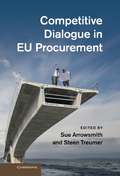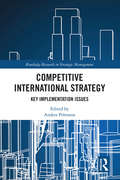- Table View
- List View
Competition Law in Crisis: The Antitrust Response to Economic Shocks
by Bruce WardhaughA common criticism of the competition rules posed by EU authorities is that they are too inflexible, thereby prohibiting adequate responses to economic and industrial shocks. Competition Law in Crisis challenges this suggestion through an examination of competition responses to crises past and present. With an analysis spanning the response of UK and EU competition authorities to the economic and commercial outfall of the 2008 financial crisis, the COVID-19 pandemic, and potential responses to the climate crisis in the context of post-Brexit British industrial policy, the book argues that relaxing the competition regime is precisely the wrong response. The rigidity of competition rules in the UK and EU has both normative and positive implications for not just the methodology used in competition analysis, but also the role of competition law within the legal order of both jurisdictions. The book concludes with a discussion of the place of the competition in the UK's and EU's legal order.
Competition Law in South Asia: Policy Diffusion and Transfer (Global Competition Law and Economics Policy)
by Amber DarrIn the last twenty years, South Asian countries have increasingly engaged with modern competition legislation. Yet, apart from India and Pakistan, the countries in this region have had little success enforcing these laws. Competition Law in South Asia analyses the mechanisms and institutions through which Bangladesh, Bhutan, India, Pakistan, Maldives Nepal, Sri Lanka, and Afghanistan have engaged with modern competition legislation. The book argues that the success (or failure) of competition reform in these countries is inextricably linked to the unique interplay of mechanisms and legal and political institutions through which these countries have engaged with competition legislation. The book provides an in-depth comparative analysis of the adoption and implementation continuum in India and Pakistan, the compatibility and legitimacy generated by the adoption process, and its impact on implementation. Taking a far-reaching, comparative approach, the book draws lessons not only for countries in South Asia but also for emerging economies across the globe.
Competition Law in Switzerland: Law and Practice in a European Context
by Pranvera KëlleziThis is the first comprehensive English-language overview of competition law enforcement in Switzerland since the introduction of direct sanctions in 2004. It discusses the key issues facing practitioners: horizontal and vertical agreements (with a particular emphasis on distribution agreements), abuse of dominance, and the newly introduced provisions on relative market power and merger control. It also provides an overview of the key procedural provisions, leniency and amicable settlements, and fines. The book subsequently analyses the main differences between Swiss and EU competition law and explains why, to what extent, and how companies should conduct a separate analysis under Swiss law. It offers a comprehensive overview and accessible analysis, based on in-depth research of case law, for practitioners and in-house counsels who need to ensure compliance with competition law on a Swiss, European or international basis. It is also a valuable guide for all practitioners, academics and students interested in understanding Swiss competition law. Enforcement of competition law in Switzerland has intensified and is becoming increasingly important for global companies selling in Switzerland. Moreover, the fines have increased over the last twenty years, and many foreign companies have had to pay substantial fines in recent years. Lastly, the Swiss Federal Supreme Court has now extended the extraterritorial application of Swiss competition law to foreign companies where sales to Switzerland are possible.
Competition Law in the CARICOM Single Market and Economy
by Alina Kaczorowska-IrelandCompetition Law in the CARICOM Single Market and Economy provides a comprehensive introduction to and overview of this emerging area of law, discussing both the current context and potential directions for future development. The book provides an account of major topics in the law, including the economics of competition law; enterprise; enforcement; regulation; and obligations of member states. It traces the progression of the law from the 2006 Revised Treaty of Chaguaramas, charting the main developments such as the establishment of CARICOM Competition Commission (CCC), and examining the emerging case law in this important and fast-growing area. Offering the first major exploration of Caribbean Competition law, this text will be an essential resource for lawyers, businesspersons, and students of the law in the Caribbean.
Competition Law, Regulation and Digital Platforms: Japan, China, UK, EU and USA (Routledge Studies in the Growth Economies of Asia)
by Ruth Taplin Kazuhiko FuchikawaThis book confronts and analyses how competition law in its present form is unable to deal with the new advances in digital technology that have made tech giants not subject to national jurisdictions as they straddle the world, with a particular focus on Japan, China, UK, EU and USA.Demonstrating how the gatekeeping role of digital platforms has broken through the boundaries of national regulation, this book highlights examples where companies have broken and infringed antitrust law with impunity, pursuing self-preferencing and unfair competition practices solely for their own profitability. It also identifies how tech giants can open their digital platforms for fair use by consumers, small and medium enterprises (SMEs), and creators ,while still allowing tech giants to maintain their important role as gatekeepers of digital security that protects users from cyberattacks. This is followed by an examination of the similarities between tech giants and big pharma within the competition law and intellectual property context, revealing how tech giants are beginning to target the healthcare sector.Exploring how intellectual property rights are interwoven through new modernising regulations to curtail the dominance of Big Tech on digital platforms, this book will appeal to students, scholars and practitioners of Business Ethics, Intellectual Property, Law, and Regulation.
Competition Law: Volume Ii (The\library Of Essays On Antitrust And Competition Law Ser.)
by Rosa GreavesThis book was published in 2003. Competition/anti-trust law, as a separate body of law, is very much a creation of the 20th century and grew only in maturity in the latter half of that century. As developments in US anti-trust law have had, and continue to have, an important influence on the development of competition law in Europe and worldwide, articles have been selected for this collection from both sides of the Atlantic. The volume focuses on the following aspects: the objectives and nature of competition law, the scope of competition law, selected legal concepts and challenges in competition law, and the global application of competition law.
Competition Overdose: How Free Market Mythology Transformed Us from Citizen Kings to Market Servants
by Ariel Ezrachi Maurice E. StuckeUsing dozens of vivid examples to show how society overprescribed competition as a solution and when unbridled rivalry hurts consumers, kills entrepreneurship, and increases economic inequality, two free-market thinkers diagnose the sickness caused by competition overdose and provide remedies that will promote sustainable growth and progress for everyone, not just wealthy shareholders and those at the top.Whatever illness our society suffers, competition is the remedy. Do we want better schools for our children? Cheaper prices for everything? More choices in the marketplace? The answer is always: Increase competition. Yet, many of us are unhappy with the results. We think we’re paying less, but we’re getting much less. Our food has undeclared additives (or worse), our drinking water contains toxic chemicals, our hotel bills reveal surprise additions, our kids’ schools are failing, our activities are tracked so that advertisers can target us with relentless promotions. All will be cured, we are told, by increasing the competitive pressure and defanging the bloated regulatory state.In a captivating exposé, Maurice E. Stucke and Ariel Ezrachi show how we are falling prey to greed, chicanery, and cronyism. Refuting the almost religious belief in rivalry as the vehicle for prosperity, the authors identify the powerful corporations, lobbyists, and lawmakers responsible for pushing this toxic competition—and argue instead for a healthier, even nobler, form of competition.Competition Overdose diagnoses the disease—and provides a cure for it.
Competition Policy
by Massimo MottaThis is the first book to provide a systematic treatment of the economics of antitrust (or competition policy) in a global context. It draws on the literature of industrial organisation and on original analyses to deal with such important issues as cartels, joint-ventures, mergers, vertical contracts, predatory pricing, exclusionary practices, and price discrimination, and to formulate policy implications on these issues. The interaction between theory and practice is one of the main features of the book, which contains frequent references to competition policy cases and a few fully developed case studies. The treatment is written to appeal to practitioners and students, to lawyers and economists. It is not only a textbook in economics for first year graduate or advanced undergraduate courses, but also a book for all those who wish to understand competition issues in a clear and rigorous way. Exercises and some solved problems are provided.
Competition Policy Enforcement in EU Member States: What is Independence for? (European Administrative Governance)
by Mattia GuidiThis book investigates the crucial EU policy of competition, which is enforced by the Commission and by national agencies that enjoy various degrees of autonomy from their governments. More and more policy-making activities are nowadays delegated to agencies that cannot be held accountable to parliaments, and ultimately to voters. The author explains why this is the case in the field of EU competition policy and discusses whether independence is linked to improved enforcement - as theories of delegation and common wisdom would suggest. These questions are explored with an in-depth analysis covering 27 EU countries for 17 years (1993-2009). While the results show that independence is given when countries lack credibility and good reputation, they also point out that autonomy from governments can hardly be associated with improved regulatory output. So, is independence of competition authorities useful to society in the end? This book will appeal to upper-level students and scholars interested in competition policy, regulatory agencies, and European public policy.
Competition Policy and Intellectual Property in Today's Global Economy
by Robert D. Anderson Antony Taubman de Carvalho, Nuno PiresThe fast-evolving relationship between the promotion of welfare-enhancing competition and the balanced protection of intellectual property (IP) rights has attracted the attention of policymakers, analysts and scholars. This interest is inevitable in an environment that lays ever greater emphasis on the management of knowledge and innovation and on mechanisms to ensure that the public derives the expected social and economic benefits from this innovation and the spread of knowledge. This book looks at the positive linkage between IP and competition in jurisdictions around the world, surveying developments and policy issues from an international and comparative perspective. It includes analysis of key doctrinal and policy issues by leading academics and practitioners from around the globe and a cutting-edge survey of related developments across both developed and developing economies. It also situates current policy developments at the national level in the context of multilateral developments, at WIPO, WTO and elsewhere.
Competition Policy and Patent Law under Uncertainty
by Geoffrey A. Manne Joshua D. WrightThe regulation of innovation and the optimal design of legal institutions in an environment of uncertainty are two of the most important policy challenges of the twenty-first century. Innovation is critical to economic growth. Regulatory design decisions and, in particular, competition policy and intellectual property regimes can have profound consequences for economic growth. However, remarkably little is known about the relationship between innovation, competition and regulatory policy. Any legal regime must attempt to assess the trade-offs associated with rules that will affect incentives to innovate, allocative efficiency, competition, and freedom of economic actors to commercialize the fruits of their innovative labors. The essays in this book approach this critical set of problems from an economic perspective, relying on the tools of microeconomics, quantitative analysis and comparative institutional analysis to explore and begin to provide answers to the myriad challenges facing policymakers.
Competition Policy and Price Fixing
by Louis KaplowThroughout the world, the rule against price fixing is competition law's most important and least controversial prohibition. Yet there is far less consensus than meets the eye on what constitutes price fixing, and prevalent understandings conflict with the teachings of oligopoly theory that supposedly underlie modern competition policy. Competition Policy and Price Fixing provides the needed analytical foundation. It offers a fresh, in-depth exploration of competition law's horizontal agreement requirement, presents a systematic analysis of how best to address the problem of coordinated oligopolistic price elevation, and compares the resulting direct approach to the orthodox prohibition. In doing so, Louis Kaplow elaborates the relevant benefits and costs of potential solutions, investigates how coordinated price elevation is best detected in light of the error costs associated with different types of proof, and examines appropriate sanctions. Existing literature devotes remarkably little attention to these key subjects and instead concerns itself with limiting penalties to certain sorts of interfirm communications. Challenging conventional wisdom, Kaplow shows how this circumscribed view is less well grounded in the statutes, principles, and precedents of competition law than is a more direct, functional proscription. More important, by comparison to the communications-based prohibition, he explains how the direct approach targets situations that involve both greater social harm and less risk of chilling desirable behavior--and is also easier to apply.
Competition Policy in the Global Economy: Modalities for Co-operation (Routledge Studies in the Modern World Economy)
by Leonard Waverman William S. Comanor Akira GotoInternational agreements on competition law and policy are notoriously difficult to implement. This collection of essays examines the complexities involved when the issues of international co-ordination and harmonization of competition law and policy are considered.
Competition and Intellectual Property Law in Ukraine (MPI Studies on Intellectual Property and Competition Law #31)
by Heiko RichterThis volume provides the most comprehensive contemporary academic writing on Ukrainian competition and intellectual property law in English. Especially over the last few years, these areas have been in considerable flux, a main driver being the EU–Ukraine Association Agreement. The chapters cover a broad range of different topics and share a forward-looking perspective. They also outline the basic background that is necessary to understand the context of the issue discussed, especially with regards to the legal system of Ukraine. The publication is the result of a two-year project, and it is addressed to a wide range of international scholars, practitioners, and policy makers. It aims to make the state-of-the-art in Ukrainian legal scholarship visible and accessible to the international research community and to stimulate global debates in academia and politics. Therefore, it may be of interest and use to anyone who is interested in competition and intellectual property law, and/or in Ukraine.
Competition and Investment in Air Transport: Legal and Economic Issues
by Ruwantissa AbeyratneThis book addresses emerging legal and economic issues in competition and investment in air transport, against the backdrop of the role governments and airlines should play in avoiding protectionism and encouraging innovation and creativity. It evaluates current trends in air transport and the direction the industry is taking in the twenty first century. There are discussions on key aspects of air transport, such as safety assurance and environmental protection, as they are impacted by competition. The rapid evolution of aerospace transport and its effect on competition in air transport is also examined. A recurring theme of the book is the influence of creative destruction and disruptive innovation on air transport. This is addressed through an in-depth study of the contentious areas of law relating to the abuse of dominant positions and state aid, as reflected in the ongoing claim by the three largest US carriers against Gulf carriers such as Emirates Airlines, Etihad and Qatar Airways. The US carriers claim that Emirates and Etihad - which operate air services into the United States by virtue of an open-skies agreement between the US and The United Arab Emirates - are using generous subsidies given to them by their g overnments to illegally capture the "legitimate" market belonging to the US carriers. These issues are clarified in the book using analyses of competition law and investment law as they apply to air transport, free-trade-agreement analogies and an open-skies case study.
Competition and Regulation in the Airline Industry: Puppets in Chaos (Routledge Research in Competition Law)
by Steven TruxalAn examination of the relationship between competition and the deregulation and liberalisation of the US and European air transport sectors reveals that the structure of the air transport sector has undergone a number of significant changes. A growing number of airlines are entering into horizontal and vertical cooperative arrangements and integration including franchising, codeshare agreements, alliances, ‘virtual mergers’ and in some cases, mergers with other airlines, groups of airlines or other complementary lines of business such as airports. This book considers the current legal issues affecting the air transport sector incorporating recent developments in the industry, including the end of certain exemptions from EU competition rules, the effect of the EU-US Open Skies Agreement, the accession of new EU Member States and the Lisbon Treaty. The book explores the differing European and US regulatory approaches to the changes in the industry and examines how airlines have remained economically efficient in what is perceived as a complex and confused regulatory environment. Competition and Regulation in the Airline Industry will be of particular interest to academics and students of competition law as well as EU law.
Competition and the State
by Ioannis Lianos D. Daniel Sokol Thomas K. ChengCompetition and the State analyzes the role of the state across a number of dimensions as it relates to competition law and policy across a number of dimensions. This book re-conceptualizes the interaction between competition law and government activities in light of the profound transformation of the conception of state action in recent years by looking to the challenges of privatization, new public management, and public-private partnerships. It then asks whether there is a substantive legal framework that might be put in place to address competition issues as they relate to the role of the state. Various chapters also provide case studies of national experiences. The volume also examines one of the most highly controversial policy issues within the competition and regulatory sphere#151;the role of competition law and policy in the financial sector. This book, the third in the Global Competition Law and Economics series, provides a number of viewpoints of what competition law and policy mean both in theory and practice in a development context.
Competition and the State
by Ioannis Lianos D. Daniel Sokol Thomas K. ChengCompetition and the State analyzes the role of the state across a number of dimensions as it relates to competition law and policy across a number of dimensions. This book re-conceptualizes the interaction between competition law and government activities in light of the profound transformation of the conception of state action in recent years by looking to the challenges of privatization, new public management, and public-private partnerships. It then asks whether there is a substantive legal framework that might be put in place to address competition issues as they relate to the role of the state. Various chapters also provide case studies of national experiences. The volume also examines one of the most highly controversial policy issues within the competition and regulatory sphere#151;the role of competition law and policy in the financial sector. This book, the third in the Global Competition Law and Economics series, provides a number of viewpoints of what competition law and policy mean both in theory and practice in a development context.
Competition for Public Transport Services: Institutional Framework and Empirical Evidence of Bus Services in Germany (Contributions to Economics)
by Arne BeckThis book evaluates the successes, failures, and factors that influence the competition for public bus transport services. Using Germany as a case study, the author explains the dichotomous system of a market with licenses for commercial services, where operators are granted exclusivity, and licenses for non-commercial services, where supplementary direct subsidies are tendered out by public transport authorities. The empirical analysis is based on primary data usually not publicly available, and supplemented by numerous expert interviews. The book aims to provide a basic understanding of the players and their options, offer insights into the German model, and make policy recommendations for those whose goal is to increase competition.
Competition is Killing Us: How Big Business is Harming Our Society and Planet - and What To Do About It
by Michelle MeagherWe live in the age of big companies where rising levels of power are concentrated in the hands of a few. Yet no government or organisation has the power to regulate these titans and hold them to account. We need big companies to share their power and we, the people of the world, need to reclaim it. In Competition is Killing Us, top business and competition lawyer Michelle Meagher establishes a new framework to control capitalism from the inside in order to make it work for the many and not just the few. Meagher has spent years campaigning against these multi-billion and trillion dollar mammoths that dominate the market and prioritise shareholder profits over all else; leading to extreme wealth inequality, inhumane conditions for workers and relentless pressure on the environment.In this revolutionary book, she introduces her wholly-achievable alternative; a fair and comprehensive competition law that limits unfair mergers, enforces accountability and redistributes power through stakeholder governance.
Competition on the Internet (MPI Studies on Intellectual Property and Competition Law #23)
by Gintarė SurblytėUndeniably widespread and powerful as it is, the Internet is not almighty: it can reach as high as the skies (cloud computing), but it cannot escape competition. Yet, safeguarding competition in "the network of networks" is not without challenges: not only are competitive processes in platform-based industries complex, so is competition law analysis. The latter is often challenged by the difficulties in predicting the outcome of competition, in particular in terms of innovation. Do the specific competition law issues in a digital environment presuppose a reconsideration of competition law concepts and their application? Can current competition law tools be adjusted to the rush pace of dynamic industries? To what extent could competition law be supplemented by regulation - is the latter a foe or rather an ally? This book provides an analysis of recent developments in the most relevant competition law cases in a digital environment on both sides of the Atlantic (the EU and the US) and assesses platform competition issues from a legal as well as an economic point of view.
Competitive Business Management: A Global Perspective (Routledge-Giappichelli Studies in Business and Management)
by Silvio M. BrondoniThe growth of global corporations has led to the development of new business strategies whose complexity and configuration rest on corporate networks; corporate cross-culture and intangible corporate and product assets. In global markets, corporations compete in a competitive marketspace dimension, in other words, competitive boundaries in which space is not a stable element of the decision-making process, but a competitive factor whose complexity depends on markets increasingly characterized by time-based competition and over-supply. In view of today's fierce competition from US and Southeast Asian corporations, this book highlights global business development policies based on innovation, sustainability and intangible assets. The book assesses competitive business management from a global perspective, examining business development policies linked to the profitability of global firms. It forces readers to actively think through the most fundamental policies developed by global firms in the current competitive landscape and provides answers to questions such as: What are the new drivers of global capitalism?; How do global businesses deal with new local nationalism?; Which governance systems and behavioural norms qualify global businesses?; What are the main business policies that characterize competitive business management in a global competition perspective? Competitive Business Management neatly explains the global business management domain and helps readers to gain an understanding of global development business policies.
Competitive Dialogue in Eu Procurement
by Sue Arrowsmith Steen TreumerCompetitive dialogue is a procedure introduced into the EU procurement system in 2004 to provide an improved method for awarding complex contracts, such as those for public infrastructure and major IT systems. This book provides a critical examination of the legal rules on this new procedure, focusing in particular on grey areas such as availability of the procedure and the scope for negotiations after 'final tenders'. It considers both the EU-level rules and the way in which those rules have been applied in national systems. The examination draws on extensive evidence of the way in which the procedure has been operated and interpreted across Europe, including from several studies commissioned specifically for this volume. It also includes an extensive chapter co-authored by the volume editors which provides a thorough analysis of the EU-level rules, a comparative reflection on national experiences and significant critical commentary and recommendations.
Competitive International Strategy: Key Implementation Issues (Routledge Research in Strategic Management)
by Anders PehrssonContemporary businesses are exposed to global competition enhanced by new information technology and liberalized cross-border transactions in many industries. This introduces a new competitive dynamic, influenced by actors in developed and emerging markets. The dynamic puts major demands on executives as they consider future moves that support strategic initiatives. The context of intensified global competition requires attention from practicing (and aspiring) leaders in international business organizations. Drawing on contemporary research, Competitive International Strategy: Key Implementation Issues addresses international business strategy formulation and implementation in the global competitive market. It captures the essential strategy components by elaborating on the implementation of corporate integration and local responsiveness. This is considered a vital dichotomy in the development of international business strategies. Essential components include competition context, firm’s resources, strategy directions and competence, implementation issues, and competitiveness. The book includes several detailed company cases. Bridging the strategy formulation and implementation is crucial for the ultimate success of international business firms. This book will be of great value to students at an advanced level, academics, and reflective practitioners in the fields of strategic management, leadership, and international business.
Complejo Médico Industrial
by David Arieta Galván James Morcan Lance MorcanComplejo Médico Industrial no es una crítica sin restricciones de la medicina convencional y los diferentes actores que componen una de las más grandes y rentables industria en el planeta. Incluyendo un prólogo por parte del farmacéutico retirado Denis Toovey (autor de Better Health for You: An Insider’s Big Picture Guide), este explosivo libro explora la discusión de que las Grandes Farmacéuticas y otros participantes en el sector del cuidado de la salud ponen las ganancias por delante del bienestar de los pacientes y los dólares antes que las vidas. Complejo Médico Industrial no deja duda de que algo malo ha sucedido en el campo médico y lo que debe ser la profesión más noble ha estado severamente comprometida por varios conflictos de interés. Los autores examinan esto en un lenguaje que cualquiera puede entender. En el proceso, hacen notar el desenfrenado mercantilismo, el egoísmo político y la academia dogmática que plaga a la industria. Se le recuerda al lector que existe mucha gente honorable en el negocio médico que está haciendo cosas increíbles por sus semejantes. Sin embargo, también se le recuerda que médicos, hospitales, la academia médica, las compañías farmacéuticas, los proveedores de equipo médico, aseguradoras y otros hacen su dinero de gente enferma, no saludable, y si todo el mundo estuviera sano muchos de los arriba mencionados estarían fuera del negocio… por lo que no está en sus intereses financieros curar enfermedades y males. Complejo Médico Industrial hace algunas fuertes preguntas. Como: ¿Es tu médico uno de esos que recibe sobornos de compañías farmacéuticas? ¿Qué tan peligrosos son nuestros hospitales para los pacientes? ¿Las compañías farmacéuticas hacen medicamentos o dinero? ¿Es inteligente que los padres vacunen a sus hijos? ¿Conoces las pruebas médicas que pueden matarte? ¿Las curas están siendo realmente ocultas? ¿Cuándo fue la última vez que tu méd
